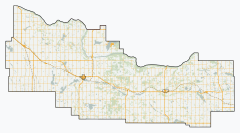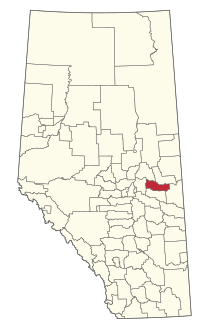Municipal district in Alberta, Canada
| County of Two Hills No. 21 | |
|---|---|
| Municipal district | |
 | |
 Location within Alberta Location within Alberta | |
| Coordinates: 53°42′54″N 111°44′46″W / 53.71500°N 111.74611°W / 53.71500; -111.74611 | |
| Country | Canada |
| Province | Alberta |
| Region | Central Alberta |
| Census division | 10 |
| Established | 1963 |
| Incorporated | 1963 |
| Government | |
| • Reeve | Don Gulayec |
| • Governing body | County of Two Hills Council |
| • Administrative office | Two Hills |
| Area | |
| • Land | 2,600.15 km (1,003.92 sq mi) |
| Population | |
| • Total | 3,412 |
| • Density | 1.3/km (3/sq mi) |
| Time zone | UTC−7 (MST) |
| • Summer (DST) | UTC−6 (MDT) |
| Website | thcounty.ab.ca |
The County of Two Hills No. 21 is a municipal district in east-central Alberta, Canada. Located in Census Division No. 10, its municipal office is located in the Town of Two Hills.
The County's flag depicts an outline of the region, with a wheat bushel, cow, and oil derrick alongside the County's name and the seal of Alberta.
History
The County of Two Hills No. 21 was formed in 1963 through the amalgamation of the Municipal District of Eagle No. 81 and the Two Hills School Division.
Geography
Communities and localities
|
The following urban municipalities are surrounded by the County of Two Hills No. 21.
The following hamlets are located within the County of Two Hills No. 21.
|
The following localities are located within the County of Two Hills No. 21.
|
Demographics
In the 2021 Census of Population conducted by Statistics Canada, the County of Two Hills No. 21 had a population of 3,412 living in 1,148 of its 1,590 total private dwellings, a change of -6.3% from its 2016 population of 3,641. With a land area of 2,600.15 km (1,003.92 sq mi), it had a population density of 1.3/km (3.4/sq mi) in 2021.
In the 2016 Census of Population conducted by Statistics Canada, the County of Two Hills No. 21 had a population of 3,322 living in 1,105 of its 1,499 total private dwellings, a 5.1% change from its 2011 population of 3,160. With a land area of 2,637.18 km (1,018.22 sq mi), it had a population density of 1.3/km (3.3/sq mi) in 2016.
See also
References
- Alberta Municipal Affairs: Municipal Officials Search
- ^ "Population and dwelling counts: Canada, provinces and territories, and census subdivisions (municipalities)". Statistics Canada. February 9, 2022. Retrieved February 9, 2022.
- ^ "Specialized and Rural Municipalities and Their Communities" (PDF). Alberta Municipal Affairs. June 3, 2024. Retrieved June 14, 2024.
- "O.C. 240/2017". Government of Alberta. June 12, 2017. Retrieved September 30, 2017.
- "Standard Geographical Classification (SGC) 2006, Economic Regions: 4810048 - Two Hills County No. 21, geographical codes and localities, 2006". Statistics Canada. March 5, 2010. Archived from the original on May 25, 2013. Retrieved August 12, 2012.
- "Population and dwelling counts, for Canada, provinces and territories, and census subdivisions (municipalities), 2016 and 2011 censuses – 100% data (Alberta)". Statistics Canada. February 8, 2017. Retrieved February 8, 2017.
External links
| Places adjacent to County of Two Hills No. 21 | |
|---|---|